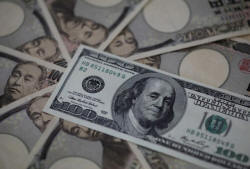|
 China
sell-off sends yen, Swiss franc soaring China
sell-off sends yen, Swiss franc soaring
 Send a link to a friend
Send a link to a friend
[January 04, 2016]
By Patrick Graham
LONDON (Reuters) - The dollar sank to an
11-week low against the yen on Monday, hit by a renewed stock market
selloff in China that sent traders running for the traditional security
of the Japanese currency and the Swiss franc.
|
|
 Even if a majority of the biggest bank and fund traders expect more
strength for the greenback this year, doubts about that have been
writ large in a month when it fell almost 5 percent against the euro
and almost 3 against the yen. Even if a majority of the biggest bank and fund traders expect more
strength for the greenback this year, doubts about that have been
writ large in a month when it fell almost 5 percent against the euro
and almost 3 against the yen.
Another 6-7 percent slide in Shanghai shares was the trigger on
Monday, suggesting again that the global economy may struggle to
handle many more rises in U.S. interest rates this year - likely to
be the central driver for any further dollar rally.
China's yuan currency hit its lowest in more than 4 years in both
onshore and offshore trade.
The Australian and New Zealand dollars, which all tend to be
dependent on growth and the buoyancy of commodity prices, were also
down more than 1 percent.
"All about China really," said the head of foreign exchange at one
large London brokerage, asking not to be named.

"Volumes are still not that high but it has been a very interesting
start this morning. The weakening of the yuan is getting a lot of
attention."
The yen rose 1.2 percent against the dollar to 118.90 yen, while the
franc hit highs of 0.9924 francs per dollar before trimming gains to
around half a percent at 0.9980.
The euro gained half a percent to $1.0907.
The world's biggest trading bank, Citi, recommended buying the yen
overnight with a two-week perspective before swiftly recommending
clients close out the same trade thanks to the scale of the move
against the dollar. The bank remained broadly downbeat on the
dollar's prospects ahead of ISM sentiment data later in the day.
"While we doubt that a lasting shift in trend toward weaker data
will be seen, there are some immediate risks," strategist Josh
O'Byrne said in a morning note to clients.
"Given recent disappointment from regional surveys, there is some
risk for dollar losses associated with today’s ISM report."
Tension in the Middle East was also playing a role after Saudi
Arabia on Sunday severed ties with Iran.
[to top of second column] |

Data showed China's factory activity shrank for the tenth straight
month in December, hitting shares across Asia.
China's moves last week to clamp down on play by some foreign banks
on the arbitrage between its onshore and offshore currency markets
was also read as a sign of concern over the scale of capital
outflows.
"There is clearly some kind of shock in this area (the currency
market)," said a senior trader with one large Asian bank in London.
"But I wouldn't overstate the scale of the action today. My feeling
is it may calm down."
The gap between on and offshore rates was still short of a 2
percentage point mark viewed by some in the market as the limit of
the People's Bank of China's tolerance. Offshore rates fell by a
full percentage point to 6.6324 per dollar.
The onshore yuan - trading for the first time on Monday until
mid-afternoon in Europe under another change to market
infrastructure - fell 0.6 percent to 6.5338.
(Editing by Toby Chopra)
[© 2016 Thomson Reuters. All rights
reserved.] Copyright 2016 Reuters. All rights reserved. This material may not be published,
broadcast, rewritten or redistributed.

 |